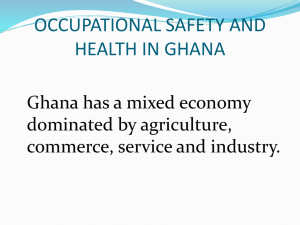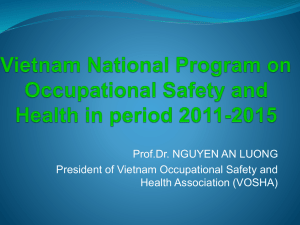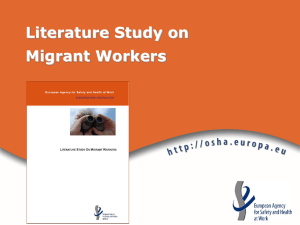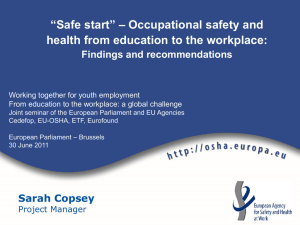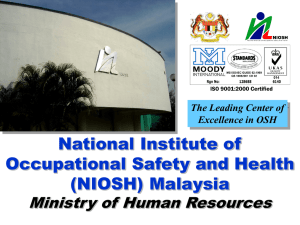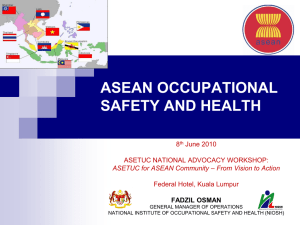OSH in School
advertisement
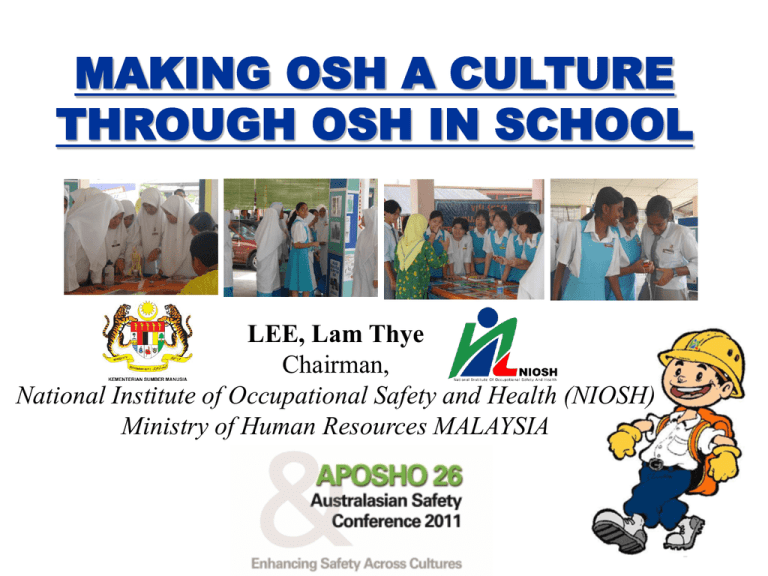
MAKING OSH A CULTURE THROUGH OSH IN SCHOOL LEE, Lam Thye Chairman, National Institute of Occupational Safety and Health (NIOSH) Ministry of Human Resources MALAYSIA OSH in School: The Malaysian Experience In order to make OSH a culture in any country, it is necessary to begin with the young generation. In line with this objective NIOSH Malaysia has embarked upon an “OSH in School” Programme which was introduced with the objective of making schools safe and healthy places of work for teachers, school staff, students and visitors alike. OSH in School: The Malaysian Experience In an effort to make our schools safe places for study and work, the National Institute of Occupational Safety and Health (NIOSH) has offered assistance to the Malaysian Education Ministry to create awareness of safety and health in schools through the 'OSH in School' programme. In this connection NIOSH has successfully implemented a pilot project involving primary and secondary schools with the sponsorship from private-sector companies. OSH in School: The Malaysian Experience In Malaysia over the years, there were reports of accidents in schools, involving teachers, students and staff arising from collapse of building structures, ceiling fans, goal posts as well as accidents in school laboratories and school toilets. Schools must be regarded not only as a place to study but also as a workplace. OSH in School: The Malaysian Experience “The OSH in school” Programme covers another dimension and views school as a workplace, in accordance with the Occupational Safety and Health Act (OSHA) 1994. In the case of schools, the working people are teachers, administrative and other support staff while the “others” are those affected by activities of the working people who primarily would be the students. OSH in School: The Malaysian Experience The application of OSHA to schools as places of work aims to make them safe and healthy for teachers, students and visitors. The programme aims: To ensure safety, health and welfare for those at work; To protect the students against risk to safety and health in connection with the activities of persons at work; and To establish a safe and healthy working environment involving the office, laboratory, canteen, toilet, hostel, school fields etc. OSH in School: The Malaysian Experience Through the “OSH in school” Programme, NIOSH hopes to impress upon the schools the importance of good OSH management as a solution to all problems related to OSH. Training and information dissemination are the main elements in ensuring that teachers and students know the risk they are facing in the workplace and how to work safely in order to deal with the risks. OSH in School: The Malaysian Experience Target Groups The implementation of “OSH in School” Programme involves the following target groups”: I) Teachers (academic staff) Teachers have to be educated and trained to work safely in schools. Topics for OSH training for the teachers include: a) b) c) d) e) Understanding the Occupational Safety and Health Act (OSHA 1994); Establishment of the Safety and Health Committee to discuss all OSH related issues; Understanding the HIRARC concept which is hazards identification, risk assessment and risk control; Usage of Personal Protective Equipment (PPEs); and Implementation of an OSH Management System (OSH-MS). OSH in School: The Malaysian Experience II) Support Staff (administrative, general and technical staff) Safety issues should include school buildings, structures, toilets, school canteens, classrooms, office room, laboratories, school fields, etc. Hence, OSH awareness should not only be limited to teachers alone but also extended to all other staffs. Activities may include talks and demonstrations on topics such as: a) b) c) d) Workers responsibility under the OSH Act 1994; Hazards identification, risk assessment and risk control (HIRARC); Usage of Personal protective equipment (PPE); and Fire safety demonstration and fire drill practice. OSH in School: The Malaysian Experience III) Students Students are those affected by activities of the work place. Therefore, instilling OSH awareness in schools from an early and receptive age will benefit students who are going to make up the nation’s future workforce and they will eventually embrace the safety culture and contribute towards making their future workplaces accident-free. Activities involving students should include: a) b) c) d) OSH quizzes; Hazard Hunt (Identifying hazards); OSH poster competition; and Formation of OSH clubs in schools. OSH in School: The Malaysian Experience IV) Parents Parents can play their role through the Parent-Teachers Association (PTAs) in creating safety and health consciousness and promoting the safety culture. Activities that can be held include: a) b) c) Organize OSH seminars, talks and exhibition in conjunction with Annual General Meeting (AGM); Organize special workshops on identifying hazards for school excursions / outdoor activities; and Find sponsorships from the private sector to fund more “OSHin School” activities. OSH in School: The Malaysian Experience As children grow up, teachers and parents can reinforce and help them develop their knowledge of safety and health issues thus helping to prepare them for the world of work. The most urgent task is to create safety and health consciousness among the teaching and support staff as well as among the students and to promote a safety culture. OSH in School: The Malaysian Experience Guide book sponsored by Exxonmobil OSH Camp with PETRONAS In conclusion, there is the need to instill in our young generation a strong sense of safety consciousness as they progress through their education system. In Malaysia we encourage the corporate sector to discharge their social responsibility by working with NIOSH to introduce the “OSH in School” Programme and pave the way for the gradual emergence of an OSH culture in the country in the future.
